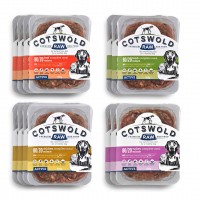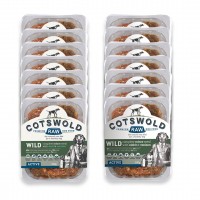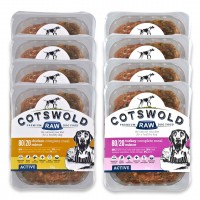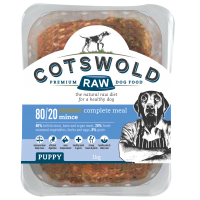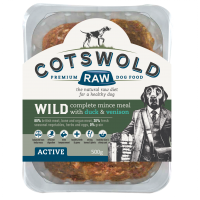Meat, Organ Meat and Protein
Meat is the primary and species-appropriate food for a dog. Dogs can survive without carbohydrates but they cannot survive without protein and fat in their diet. Muscle meat is first class protein in that it contains all the essential amino acids necessary for dogs of all ages.
Meat also supplies varying amounts of fat as well as some vitamins and minerals. Fat is the best, most easily digestible and usable energy source for dogs. It provides more than twice as much energy per gram as protein. Protein and fat should be in the correct ratio (nearly twice as much protein as fat). This ratio will be slightly lower (ie more fat) for working dogs that need extra endurance and higher for puppies.
We recommend varying the protein source in the dog's diet by feeding our different recipes. As well as alleviating boredom, dogs can develop an intolerance to certain protein sources. Our meat comes from local or regional abattoirs and farms. We use chicken that is organic and free range. We are particularly proud of the quality and traceability of our products. We offer a guaranteed supply from ‘in house’ approved farms that fall in line with our strict protocols for breeding and bio security. They do not use any growth promoters or hormones in any of the breeders or chicks.
Why do we include organ meat?
Meat and bone on their own lack certain important nutrients. Organ meats contain high level of taurine and B vitamins such as: B1, B2, B6 and B12 as well as the important fat-soluble vitamins A, D, E and K. Organ meats have some of the highest concentrations of naturally occurring vitamin D of any food source. Vitamin D is one of the most important vitamins and regulates numerous functions in the body. Vitamin D deficiency is related to muscle weakness, fractures, common cancers, autoimmune diseases and infectious diseases. They also contain the essential fatty acids and omega-3 fats, including the important EPA and DHA.
Organ meats are also densely packed with minerals like phosphorus, iron, copper, magnesium and iodine and because of this they need to be used sparingly (refer to our information on the calcium to phosphorous ratio). At Cotswold RAW organ meats represent approximately 10% of the recipe thereby maintaining the appropriate calcium:phosphorous ratio
Heart is a muscle. However, it is heavier and more dense than muscle meat and contains more protein and nutrients. Ox heart also contains selenium, phosphorus and zinc, along with essential amino acids that help build muscle, store energy and boost stamina and endurance. The heart also contains twice as much collagen and elastin than meat, which is important for healthy joints.
Organ meats build muscle, strong bones, skeletal structure and healthy joints. They improve heart function, keep reproductive organs healthy and prevent diabetes and immune disorders. They are a powerful antioxidant and aid digestion and boost stamina.
Why do we include minced bones in our complete meals?
Bones are an essential component of a dog's diet. they contain vital nutrients such as amino acids, essential fatty acids and vitamins but also, importantly, minerals such as calcium. It is vital that dogs ingest enough calcium and that the ratio of calcium to phosphorous is maintained at the correct level. Meat contains phosphorous and bones are required to achieve the correct balance.
Poultry bones are ideal as they are soft and we use poultry bone in our Turkey, Chicken and Wild recipes.
In our richer, red meat complete meals we use lamb bone in our lamb and veal bones in our beef recipes.

